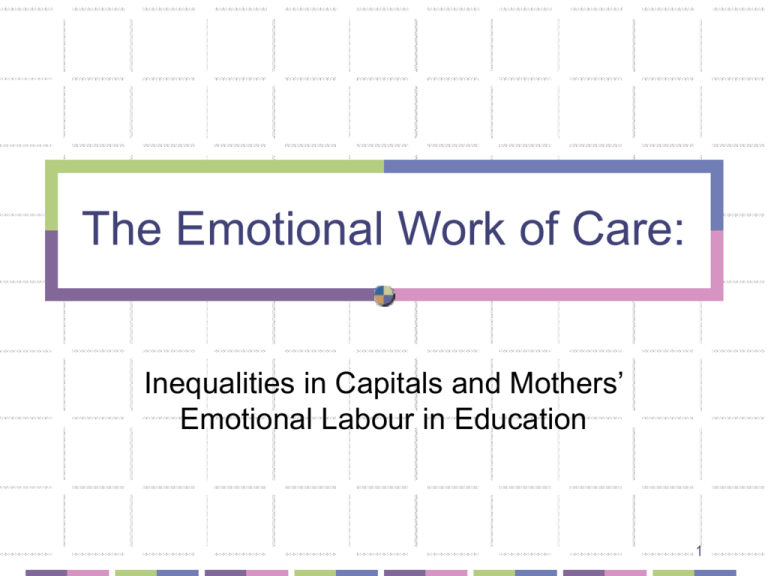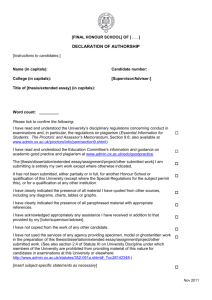
The Emotional Work of Care:
Inequalities in Capitals and Mothers’
Emotional Labour in Education
1
Concerns of this Paper
To focus on the significance of caring in the educational fieldparticularly, to highlight the nature of mothers’ involvement in
children’s education as a form of gendered moral care work and
to bring it from private consideration into public debate
To describe the educational care work done by mothers at
school transfer relative to different social positionings, and to
discuss the tensions between the idiosyncratic nature of this
care and the normalised expectations of care institutionalised
within the educational system
To explain the relationship between the gender inequality
associated with the allocation of this care to mothers, and the
inequalities between mothers relative to their capacities to
access and activate sets of resources or capitals
2
Theoretical FrameworkEmotional Care Work and Inequalities
Interdisciplinary discourse used to problematise the concept of
care and how it applies in the educational field. Lynch (1989) on
love labour as a form of uncommodifiable care work. Caring for
and about (Ungerson 1990), emotional work and intimate
relationships (Duncombe and Marsden 1993, 1996, 1998),
Hochschild (1983, 1989) on emotional management and
gendered relations.
Feminist moral philosophers on care and its centrality to moral
dispositions and behaviour - (Nussbaum 1995 2001, Bubeck,
1995, Sevenhuijsen 1998)
3
Mothers’ Care and the
Educational Field
A reductionist and gender biased discourse of parental
involvement (David et al. 1993, Reay 1998, 2000) Feminist
sociological interest in ‘school choice’ at transfer (David et al.
1994, Reay and Lucey 2000, Reay 2000, O’Brien 2001)
Mothering/caring work in education generally (Lareau 1989,
Smith 1996, Walkerdine and Lucey 1989, Plummer 2000,
Skeggs 1998, Smith 2005).
This paper draws on Bourdieu’s thesis of capitals in the context
of the production and (re)production of care, and Allatt’s
expansion of the idea of ‘emotional capital’ as educational
advantage.
4
Context for this Research-Mothers’
Emotional Care Work at School Transfer
(O’Brien 2005)
Based on a PhD study examining care work of twenty
five mothers at school transfer, chosen by theoretical
sampling- social class, marital status, ethnicity,
engagement in paid work, sexual orientation and
recently migrated.
Study sought to explore the nature of emotional care
work, its problematics and tensions relative to various
positionings, and to understand the meaning this
work held for mothers.
5
Mothers in Sample by Category
(marr=married, co-hab=cohabiting, sep=separated, al single=always single)
Full
time/Part
time/Fas
Child’s
educational
needs
Group/class
Marr,co-hab, Paid
sep, al
Work/not
single
Middle class
14
9,2,2,1
(2 lesbian, 1
sep, 1 cohab)
10
8,2,-
4
Workingclass
7
3,2,1,1
6
-,3,3
1
Traveller
2
1,1,-,-
1
-,-,1
1
Immigrant
2
2,-,-,-
0
-,-,-
-
N=25
N=25
N=17
N=17
N=6 6
Capitals and the Production of Care in
Education
Key FindingsThe significant issue of resources and capitals available to do
this gendered care work
-care is not naturally or magically produced, it is shaped and
indeed constrained by economic, cultural, social and emotional
capitals in the educational field. As Bourdieu has suggested
these are interrelated resources.
Emotional capital is understood as those internal emotional
resources and/or emotional supports accessed through personal
emotional support of an intimate or friend. A capital produced
through emotional connection and emotional recognition. (and
not necessarily through heterosexual marriage!)
Limitless care and/or lack of other resources depletes emotional7
capital daily and well-being.
Figure 1 The Moral Encoding of Mothers’ Emotional Work
The Cognitive Order
: Gender Ideologies
A
B
E2
School Work:
Researching,
Phoning,
Deciding,
Meeting
Teachers,
Organising,
Homework,
Listening, Exam
Support,
Transporting,
Extra Curricular
Understandings of Emotional Work :
Mothers’ Narratives of love, ambivalence,
inalienability of care, essentialist and feminist
positions
The Moral Order :
The Moral Imperative to Care.
Mothers’ Habitus :
E1
C
Social Positionings :
Social Practices and Dispositions Class, Race, Ethnicity, Sexual
Relative to Positionings
Orientation, Paid Work
D
General
Emotional
Work:
Listening,
Feeding,
Supporting,
Thinking,
Talking,
Worrying,
Transporting,
Managing
Capacity to Access and Activate Capitals
The Resources Order : Forms
of Capital
Economic Capital
Cultural Capital
Social Capital
Emotional Capital
F
FAMILY CONTEXT
SCHOOL CONTEXT
8
TIME
The Resources Order and Care:
Categorising Capitals
(Bourdieu 1984 and Allatt 1993)
Economic capital-assigned a value 1-4, income rated v. low to
high based on < 29,000, low 29,000-I+25%, adequate I x 2, >
high I x 2.
Credentialised cultural capital 1-4- Educational qualifications on
continuum v. low to high based on v low, primay level, low junior
cert., adequate leaving cert. and high college degree.
Social Capital-social groups, neighbours and friends that can
give social advantage
Emotional capital 1-4: Intimate emotional supports available to
mother
9
Name
Economic Capital
Cultural Capital
Social Capital
Emotional Capital
Masha
Ellie
Brigid
Maisie
Kay
Nuala
Doreen
Linda
Kate
Ruth
Sarah
Janet
Anna
Rita
Pauline
Val
Trudi
Rose
Laura
Donna
Marie
Maura
Connie
Noreen
Nell
1
1
1
1
2
2
1
3
3
3
4
3
3
2
1
1
3
2
2
3
4
4
3
4
3
3
3
1
1
1
2
2
4
4
4
3
4
4
4
1
1
4
2
1
3
4
3
3
4
3
1
1
1
1
2
2
2
3
2
3
3
2
4
3
1
1
3
2
2
3
4
3
3
4
3
1
1
2
2
3
2
2
2
2
3
2
3
4
3
1
2
3
2
2
3
3
3
2
3
3
10
Patterns of Economic and Cultural Capital
4.5
4.5
4
4
3.5
3.5
3
3
25
23
21
19
17
15
13
11
25
22
19
0
16
0
13
0.5
10
1
0.5
7
1
4
1.5
1
1.5
Cultural Capital
9
2
7
Economic Capital
Economic Capital
5
2
2.5
3
Cultural Capital
1
2.5
11
Relationships between Capitals
4.5
4.5
4
4
3.5
3.5
3
3
4.5
4.5
4
4
3.5
3.5
3
3
25
22
1
25
22
19
16
0
13
0.5
0
10
1
7
1
0.5
19
1.5
4
Cultural Capital
16
1.5
1
Economic Capital
2
13
Economic Capital
10
2
2.5
7
Cultural Capital
4
2.5
25
25
22
0
19
0
16
0.5
13
0.5
10
1
7
1
4
1.5
1
1.5
22
Emotional Capital
19
2
16
Economic Capital
13
2
10
Economic Capital
7
2.5
4
Emotional Capital
1
2.5
12
Accessing and Activating Capitals
Resources are not automatically translated into a product-care (Lareau
et al. 1999, Reay 2000) ! It takes effort, time and energy to activate
these capitals to benefit the child.
IdiosyncrasyMothers’ positioning and habitus-Anna whose sexual orientation meant
difficulties activating cultural capital in the educational field
Problems of paid work
Time away from care in paid work may increase mothers emotional
capital and capacity to care
Marginality
Masha from Dubai and Ellie found it not posssible to access the full
potential of this capital from their marginal positionings and relative to
the lack of economic and emotional resources they experienced at this
time in Ireland.
13
Specifics of Capitals and School
Transfer
Economic Capital-is required for school fees, subscriptions,
uniforms, books and equipment, extracurricular activities,
transport and hidden day to day schooling costs
-no money no choice: I wouldn’t have the money for the other school
either because their books are too expensive, here you can rent…..
-having money means choices
But…Having choices can mean more emotional work (Ruth),
Cultural capital-seems to be the capital par excellence in
discerning and supporting academic work-example of Traveller
women. But moral care sometimes requires mothers to use
cultural capital in unexpected resistances to schooling for the
child’s happiness (Anna) or because of wider familial demands
(Janet, Marie)
Social capital- ‘pressing those buttons’ to gain access to
schools, various forms of social capital in context. Being a
14
teacher, an insider. Ellie talks of her lack of social capital.
Emotional Capital and how is it accessed
and used in care?
A gendered capital: Our emotional energy and skills to care for
ourselves, and those we are in relationship with. Resilience,
positivity, connectedness, empathy used through time and to
make time to care.
Interrelated with other capitals-but could have money, friends
and education and still feel low-illness, depression,
bereavement, unemployment, separation. Running on empty!
But not quite and not allowed to not care (or children may be
taken into care-Brigid’s experience as a Traveller).
Emotional capital maintains the circle of care (Bubeck 1995)being tied to the inalienable work of care even when they lack
this basic resource-creates frustration, guilt and feelings of
inadequacy. Facilitates one’s sense of identity as a moral person
15
“finding the crock of gold”. Emotional capital links one to the
Figure 1 Spatial Metaphor: Mapping Mothers’
Access to Capitals
MASHA
ELLIE
EC
BRIGID
4
MAISIE
KAY
3
NUALA
DOREEN
LINDA
2
KATE
RUTH
SARAH
1
JANET
ANNA
EMC
CC
0
RITA
PAULINE
VAL
TRUDI
ROSE
LAURA
DONNA
MARIE
MAURA
CONNIE
NOREEN
SC
NELL
16
Figure 2 Spatial Metaphor Contrasting Capitals for
Pauline (Working Class) and Anna (Middle Class)
Contrasting Capitals
EMC
EC
4
3
2
1
0
CC
Anna
Pauline
SC
17
Conclusions? -Tackling Inequalities in
Emotional Care
Is justice then a question of redistribution of capitals?
Partly, yes, in that inequalities between women make it difficult
to care and impact on their well-being and their families..time,
money…
How or can emotional capital be redistributed?
Mothers’ emotional capital can be increased through less stress
of absence of other capitals. The question is how to increase
caring connections and that is more a political problem and of
making care central to life in all contexts (Fraser 2000,
Hochchild 1995).
18
Tackling Care Inequalities
contd.
Is redistribution of capitals sufficient for equality in care?
No, because activating capitals to do care work is subject to
positionings, and inequalities of recognition, and to
idiosyncrasies that arise from these. Moreover, issues of
respect and power are fundamental -tackling patriarchal
familial relations but how?
Tackling care inequalities must also be about gender ideology
and inequality as they have been institutionalised, as the
resources order and moral and gendered orders are linked.
Instances of ambivalence in women’s narratives showed that
being tied to intensive care even when one has the resources to
carry out the work means one’s development and well-being as
a woman are curtailed. So build up men’s emotional capital? 19








